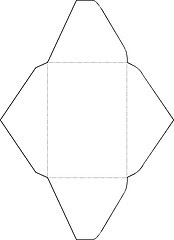
NOT MY TITLE, BUT A GOOD ONE DON'T YOU THINK? It comes from this article in Fast Company by Dev Patnaik on how the The Rotman School of Management is restructuring its MBA program based on developing business leaders who are well-grounded in multiple disciplines (including strategic and creative problem-solving). No wonder then that one premise held by the school’s dean is that “templates are the enemies of innovation.”
Hmmm.....templates. My world is littered with them. I'm always searching for them to use as examples, to shine new light on old dusty topics. But, think about it: templates are meant to provide a standard output, whether it's that envelope up there in the image or a policy statement. In the organizational context, it’s so easy to copy or spin someone else’s work, even if it’s not quite the right fit. Yet, one of our oft-stated mantras is “don’t reinvent the wheel”; when someone or some organization has already gone down that road, why should we? Templates aren’t all bad, but how do we know when to use them, when to hybridize them, and when to start from scratch?
When to Use Them
Templates are very handy for hammering together routine, systematic or non-"creative" work, particularly if it needs to fit within a larger, profession-wide context, like cataloguing specimens or music scores. Some solicitation (donor responses forms come to mind) and “how to” (such as how to sign up for a class at the art center) materials fall into this category. These are materials that may need very little or no organizational interpretation.
When to Hybridize Them
Templates become less helpful for drafting policies and procedures, mission or vision statements, planning documents and the like, where the results should fit an organization’s personality like a glove, not a hand-me-down. Their purpose can help to underscore professional practice with guiding language or in raising issues not thought of, it’s true. We need to resist the temptation to simply "fill in the blanks" without understanding the consequences of such actions on the longer term health and operational capacity of our organizations.
When to Start from Scratch
When it comes to approaching a challenge, a problem, or an opportunity from a fresh vantage point, the template is too bound up in someone else’s perspective to be useful. Templates in these contexts often act like blinders, limiting exploration and creativity. They can be especially detrimental in the long-run to organizations that circumvent the creative process by using them. Development of particularly meaning and value-laden narratives, innovative services or products, reinvented ways of accomplishing work may receive a kick-start from the examples of others, but they deserve an unimpeded space for experimentation.
Photo: envelope template from fishbowl_fish


Comments